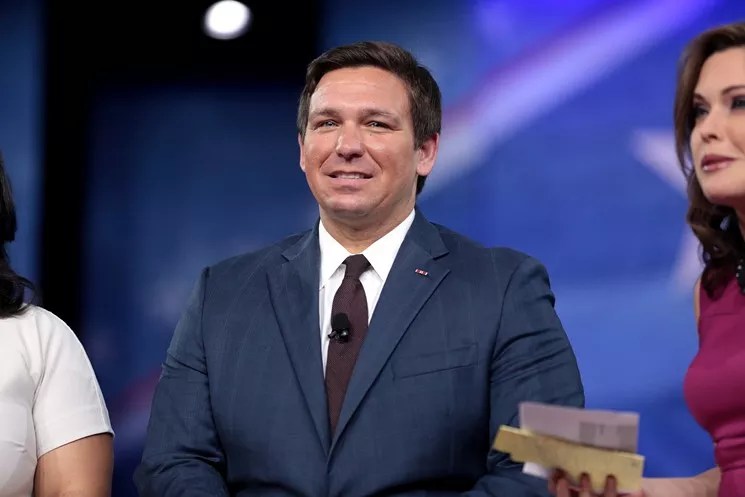

Audio By Carbonatix
Gov. Ron DeSantis and Florida GOP leaders are taking aim at the so-called big tech oligarchy with a new legislative proposal meant to regulate and punish social-media sites for their alleged bias against conservatives. But several attorneys tell New Times the proposal won’t hold water in court.
Last week, DeSantis and Florida House Speaker Chris Sprowls announced their intent to file the Transparency in Technology Act, legislation that, if enacted, would allow the Florida Elections Commission to fine tech companies that de-platform a political candidate $100,000 a day until the candidate’s page is restored.
The proposal would also allow citizens and the state attorney general to sue a tech company for alleged violations of the company’s own terms of service and allow users to opt out of content algorithms that tailor a website to a user’s interests.
This morning, Speaker @ChrisSprowls is joining @GovRonDeSantis and Senate President @WiltonSimpson for a press conference to announce big tech accountability. This will be a PCB carried by Commerce Chair @GovGoneWild. #FlaPol #YourHouse pic.twitter.com/nSRoN2OCiu
— FL House Republicans (@FLGOPMajority) February 2, 2021
Although DeSantis did not mention former President Donald Trump during his press conference about the proposal, the bill’s introduction came not long after Facebook and Twitter banned Trump’s accounts after the January 6 insurrection at the U.S. Capitol, which House Democrats allege he incited. In statements following Trump’s permanent suspensions, the platforms said the president had violated community guidelines by encouraging the violence at the Capitol.
Around the same time, tech companies Google and Apple crippled the microblogging site Parler, which had become a haven for conservatives and far-right users, by removing it from their app stores for allegedly failing to police its users and allowing posts that encouraged violence and crime. The nonprofit newsroom ProPublica reported that insurrectionists used Parler and other apps to plan the attack on the Capitol.
In the weeks since, Republicans, including DeSantis, have railed against what they see as biased treatment toward conservatives and violations of their right to free speech. The governor claimed the companies were “more of a clear and present danger to the rights of free speech than the government itself.”
But technology lawyer Berin Szóka, president of the tech law think-tank TechFreedom in Washington, D.C., tells New Times that social-media platforms have the right to decide what content gets hosted on their sites. He says the new proposal harks back to an old Florida law that was struck down in a 1974 Supreme Court decision involving the Miami Herald.
In the case, Miami Herald Publishing Co. v. Tornillo, the newspaper argued that a Florida law requiring outlets to carry replies from political opponents was unconstitutional. At the time, if a newspaper ran an editorial criticizing a candidate, the paper was required by law to print a reply from the candidate.
The Supreme Court held that the law interfered with the editorial discretion afforded to news outlets in the First Amendment’s provisions on freedom of the press. The court ruled that the press should have full discretion over what content appears in their publications, without government interference.
The same discretion applies to social-media platforms, Szóka argues.
“Newspapers can’t be forced to carry speech they don’t like, and websites have same rights as newspapers,” Szóka asserts.
Numerous federal court cases have set the precedent that social-media sites control editorial judgment over the content on their sites and therefore have the same rights as news outlets under the First Amendment, according to the Congressional Research Service.
Others have argued that any attempt by government entities to regulate the editorial practices of private companies, including DeSantis’ proposal, would violate the First Amendment.
“The law violates the First Amendment, and there’s no way they could enforce it. It’s not even close,” says Howard Wasserman, a Florida International University professor who specializes in First Amendment law. “Twitter and Facebook and all these are private. They have a right to decide who gets on and off their platform.”
Although liberals and conservatives alike have invoked the First Amendment in recent arguments over the power of tech companies to regulate speech, Wasserman says there’s an important distinction between what the Constitution actually says and what some people think it should say.
Some academics have posited that because large companies like Amazon and Twitter have so much power and control over expression, with more people speaking on social media than in a public square, they should be treated differently and be subject to regulation.
But Wasserman says those conversations have been secluded to academia so far and the law still protects social-media companies from government interference.
“A private company cannot be made to host any speech it doesn’t want to host,” he says. “Twitter can’t violate any rights because Twitter isn’t the government.”
Beyond the attempt to regulate the editorial ability of internet platforms, the Transparency in Technology Act also aims to give citizens and the attorney general an avenue to sue tech companies for not uniformly applying their community standards to all users on the basis of consumer protection.
Richard Lawson, former director of Florida’s Consumer Protection Division under the state attorney general, told WFLA News that the proposal may have some grounds on that front if users claim they’ve been deceived by the company because the guidelines allegedly don’t apply the same for everyone.
Szóka, however, argues that even that prong of the law has no teeth because the consumer-protection law only applies in claims involving commercial transactions, while community guidelines are noncommercial and a matter of social policy.
The Transparency in Technology Act, which isn’t spelled out in an official draft yet, will be brought forth from Florida’s House Commerce Committee.